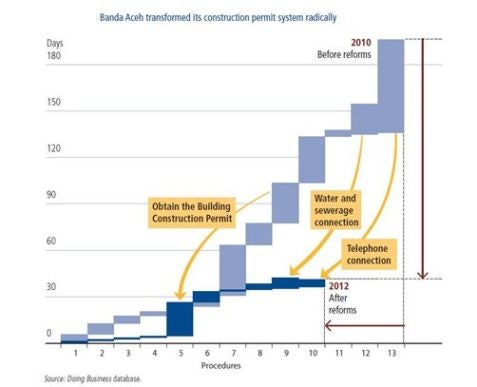Read this post in Bahasa.
Ambitious and fast rising—these words aptly describe modern Indonesia. Amidst a global economic slowdown, Indonesia was the third fastest growing economy among the G-20 for 2009 and it continues to post strong economic growth, at a projected rate of 6.4% for 2012. Improving economic competitiveness by creating a more salutary business climate is one of Indonesia’s national priorities for 2010 to 2014.
Indonesia is walking the talk. Doing Business in Indonesia 2012 launched January 31 in Jakarta, finds that all 14 cities previously measured in Doing Business in Indonesia 2010 have improved business registration processes over the last two years, while 10 out of 14 cities expedited the approval of construction permits. During his keynote address on the launching of the report, the Minister of State Ministry for Administrative Reforms talked about the cities moving from 'comfort zone' to 'competitive zone'.
The report tracks progress in the 14 cities measured for the second time and gathers micro-level data for the first time in 6 additional cities to compare business regulations in three areas of local regulation: starting a business, dealing with construction permits, and registering property. The cities are Balikpapan, Banda Aceh, Bandung, Batam, Denpasar, Gorontalo, Jakarta, Jambi, Makassar, Manado, Mataram, Medan, Palangka Raya, Palembang, Pekanbaru, Pontianak, Semarang, Surabaya, Surakarta and Yogyakarta.
The results are encouraging:
- Joint reform efforts by the national and local governments have reduced the average time to start a business and deal with construction permits by more than 25 percent since 2010. For example, it now takes three weeks faster to start a business in Semarang after the government streamlined local licensing requirements and improved efficiency at the local business registration office.
- No single city outperforms the others in all areas:it is easiest to start a business in Yogyakarta, deal with construction permits in Balikpapan, and register property in Bandung and Jakarta. It is most difficult to start a business in Manado and register property in Batam. Dealing with construction permits is most burdensome in Jakarta.
- Yogyakarta maintained its position among the top performers in starting a business. The Mayor of Yogyakarta introduced an ‘alphabet’ for working across sectors to ease doing business: ABCG stands for Academics, Business, Community and the Government.
- Cities in Indonesia have a lot to gain from adopting the regulations and practices that are working elsewhere in the country—especially in the area of construction permits. Following the example of Banda Aceh could yield a construction permit in only 42 days, and would hypothetically allow a city to rank 5th globally for its speed in that area.
Such results do not come at a surprise. The annual Doing Business 2012 report introduced this year the “Distance to Frontier” metric, and Indonesia, represented by Jakarta, is among the top 50 economies improving the most to close their gap with the top performers globally (such as Singapore, New Zealand and the Northern European economies), and among the top 5 within the East Asia and the Pacific region. For example, in the area of starting a business, improvements reduced the start up time by 70%—from 151 days in 2005 to 45 days in 2011—and the number of procedures from 12 to 8.


Join the Conversation